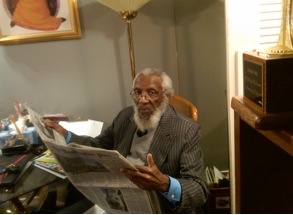Audio clip: Adobe Flash Player (version 9 or above) is required to play this audio clip. Download the latest version here. You also need to have JavaScript enabled in your browser.
Comedian and activist Dick Gregory wasn’t thrown behind bars this week, but he may be soon, possibly at the Olympics.
The longtime civil and human rights leader is fighting for compensation for victims of the 2010 Gulf Coast oil spill. It’s this effort that led to Gregory’s September arrest one block away from the White House in the office of Kenneth Feinberg, who’s in charge of dispensing (or not) BP’s $20 billion compensation fund.
After top BP executives met with the White House, President Obama announced the creation of the fund in June 2010. “This $20 billion will provide substantial assurance that the claims people and businesses have will be honored,” Obama said.
“All the casinos have been paid. All your multimillion dollar companies have been paid,” Gregory said Tuesday outside D.C. Superior Court after the trespassing charges against him were dropped. But while the rich have been paid, others haven’t, said Gregory. “It just looks like it’s a poor people thing. It’s a minority thing. It’s a women thing.”
“BP is spending millions of dollars on public relations trying to state that they have cleaned [up the Gulf Coast],” said E. Faye Williams, attorney for Gregory, and national chair of the National Congress of Black Women. “[But] we don’t see all of this cleanup that they’re talking about.”
“We’re aware of people who’ve become very ill, who’ve actually died as a result of what has happened in the Gulf,” said Williams, who’s originally from Louisiana. “Little towns are suffering… All of these places that have no cash industry… depended upon those little fish sandwiches they sold, or people pass[ing] through the town, going down to the Gulf.”
Art Rocker, chairman of Operation People for Peace, is working with impacted families along the Gulf Coast. “There are really two presidents involved,” Rocker said, standing beside Gregory and Williams. “One is named Bob Dudley, [who’s] with BP. And the other one is named President Barack Obama, who recommended Ken Feinberg.”
A great deal of power has consolidated in the hands of Feinberg, whose firm is paid by BP. While the Wall Street Journal called him “Mr. Fairness,” BBC investigative reporter Greg Palast calls him other things. “When the Energy-Finance Combine needs to screw the public, they hire a screwdriver. And they call him Mr. Fairness,” Palast writes in his new book, Vultures’ Picnic.
“Feinberg immediately did something quite odd,” notes Palast. “He required all the victims in his trust, if they took payment, to sign away their right to sue other wrongdoers at fault in the Deepwater Horizon explosion. There’s Haliburton, the company that pumped in that dodgy nitrogen cement, and Transocean, the Swiss rig owner of the Deepwater Horizon that fled from responsibility. Should they make a contribution? A trustee usually tries to ‘increase the estate,’ a fancy term for getting more money for the beneficiaries. Not Mr. Fairness.”
“I don’t think there’s any [issue] that’s as important right now,” said Gregory. His commitment to the cause landed him in London recently, where he attempted to meet with BP (British Petroleum) executives, but they sent him back to see Feinberg in DC.
Feinberg’s (in)actions, however, may send Gregory back across the Atlantic yet again, just in time for the 2012 Summer Olympics in London. “BP is right in the middle of the Olympics,” said Gregory. As the eyes of the world turn to England, if need be, said Gregory, “we’ll go there and demonstrate and go to jail.”

